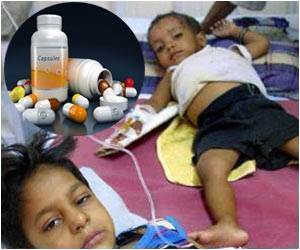Haiti's cholera epidemic which claimed nearly 8,000 lives and made more than 635,000 people ill, could be fixed by partial vaccinations.

Using a mathematical model, scientists in the United States determined that vaccination coverage of 46 percent of the population would "suppress transmission."
"In the current debate on the use of cholera vaccines... our results suggest that moderate cholera vaccine coverage would be an important element of disease control in Haiti," the team wrote in the journal Nature Scientific Reports.
Cholera, which causes potentially deadly diarrhea, is spread by ingesting food or water contaminated with a bacterium carried in human feces and spread through poor sanitation and dirty drinking water.
The WHO says there are about 100,000 to 200,000 cholera deaths worldwide every year out of an estimated three to five million infections.
In Haiti, the current outbreak had killed 7,912 people by December 31, according to the study.
Advertisement
It is widely believed to have originated around a camp of Nepalese peacekeepers in the central town of Mirebalais and spread quickly thanks to earthquake-related disruption of water and sewerage facilities.
A UN probe found there was no way of knowing what caused the epidemic, but disease experts have said the cholera strain in Haiti matched the prevalent strain in Nepal, where cholera is endemic.
Talks between the Haitian health ministry, the WHO and Pan-American Health Organization on launching a vaccination campaign "are taking place, but nothing has been agreed yet," the WHO said in response to an email query from AFP.
Unless cholera is contained, it may become endemic to Haiti, said study co-author Zindoga Mukandavire from the University of Florida.
"This is because Haiti has a large estuarine environment which may act as a possible long-term reservoir for cholera," the infectious diseases expert told AFP.
The researchers concluded that to achieve optimal protection of the population, vaccination must be combined with programs to improve water quality.
In December, the United Nations launched a $2.2-billion appeal for a campaign to halt cholera in Haiti.
A huge UN operation has been helping the impoverished country with its political strife and the impact of the January 2010 quake, which killed 250,000 people.
Source-AFP












